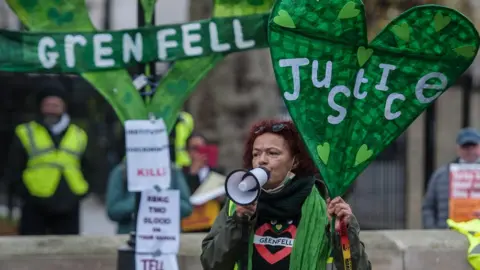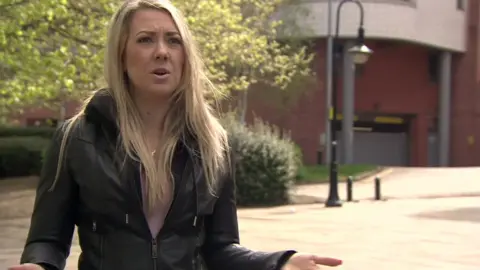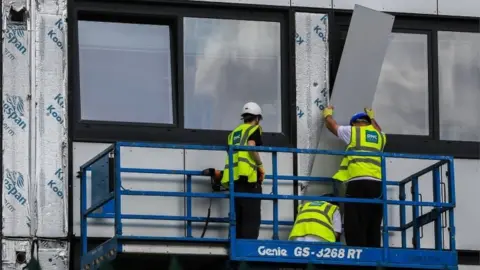Grenfell: Survivors condemn new fire safety laws
 Getty Images
Getty ImagesNew laws that could leave flat owners facing bills for fire safety measures are "indefensible", say Grenfell Tower survivors and bereaved relatives.
The Fire Safety Act is aimed at making homes safer following the 2017 blaze, in which 72 people died.
But a push to include more financial protections for leaseholders was defeated in a Parliamentary vote, despite a large Tory rebellion.
The government has made a £5bn fund available to remove cladding.
Home Secretary Priti Patel said the government was paying for remedial work to "thousands of buildings around the country".
She said the act would "actually help to save lives by changing some of these awful regulations and guidelines that existed previously".
After the Grenfell tragedy, thousands of blocks of flats were found to be covered in similar cladding.
Other defects were also discovered, leaving leaseholders facing large bills to pay for protective measures such as fire breaks, balconies, safer doors and sprinkler systems.
Ministers say a loan scheme will ensure costs are capped at £50 a month for safety works and that residents in the tallest tower blocks in England will not have to pay to have cladding removed.
'Grave injustice'
Leaseholders have described being trapped in homes they cannot sell, with their lives on hold potentially for years, because lenders will not offer mortgages until the cladding is removed.
Reports of the toll on residents' mental health have been widespread.
Campaigners say leaseholders should be protected from all remediation costs that have arisen through no fault of their own.
Critics, including some Conservative MPs, had argued the government should meet all the costs upfront and then recoup them from property developers.
The Grenfell United group, which was set up after the tragedy in west London, said it was "deeply disappointed that ministers have broken their promises to leaseholders who have done absolutely nothing wrong".
It described the government's position as "indefensible", saying it was a "grave injustice that many innocent leaseholders will be financially ruined over fire safety issues that were not of their own making", and it accused ministers of "letting those responsible continue to get off scot-free".

'It's terrifying'
Lawyer Steph Pike, a leaseholder of a one-bedroom flat in Bristol, said she could be facing a £70,000 bill next year to cover the cost of improvement work to her building.
She told the BBC the situation was "completely unbelievable" and said some days she asked herself: "Is this even happening?"
"I'm a lawyer, so I've got a professional qualification that I need to protect and if I have to declare myself bankrupt I'll lose that, so I'll also lose my career."

Leaseholder Rachael Teebay bought her first home together with her partner in Manchester, but now she is among thousands facing huge bills.
"I have spent days and weeks crying about it and worrying about our future," she told the BBC.
"Declaring bankruptcy at this age, what does that do for our future? It decimates it. It's terrifying."
Stephen Squires, a leaseholder who lives in a tower block in Manchester bearing dangerous cladding, said ministers' reluctance to compromise was "hugely disappointing and really makes us feel like the government do not grasp the severity of the situation we all find ourselves in through no fault of our own".
He added: "Our service charge account is running out of money, whilst the freeholder delays things. Eventually we could end up with having the lifts switched off or the electric being cut off to a 20-storey building, which would make it uninhabitable."

The campaigning group End Our Cladding Scandal said the legislation had passed unchanged, "much to the horror of hundreds of thousands of innocent people across the country whose lives are being ruined by the buildings safety crisis".
It said the government had "fought hard" against changes that would have saved leaseholders from "widespread bankruptcy and financial ruin caused by bad regulations, corporate malfeasance and shoddy building work".
"This [act] pulls the rug out from under a generation of homeowners" whose lives were still at risk from unsafe buildings, it added.
The group has vowed to continue opposing the reforms, tweeting: "We have the right to be angry. But the fight isn't over yet."
 PA Media
PA MediaThe new legislation modifies a previous law to clarify that building owners must manage and reduce the risk of fire in their properties.
The government was under pressure to get it passed before the end of the parliamentary session on Thursday.
It said it struck "the right balance in protecting leaseholders and being fair to taxpayers".
A Department for Housing, Communities and Local Government spokesperson said ministers were prioritising making the tallest buildings with the most dangerous cladding safer, backed by £5bn in funding.
"We have been clear throughout that owners and industry should make buildings safe without passing on costs to leaseholders - and we will ensure they pay for the mistakes of the past with a new levy and tax to contribute to the costs of remediation," they added.
"For lower-rise buildings which have a lower risk, our generous capped finance scheme will ensure bills are a maximum of £50 per month."
